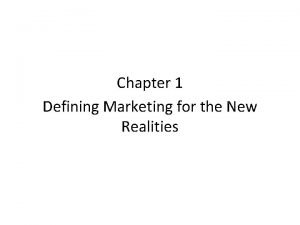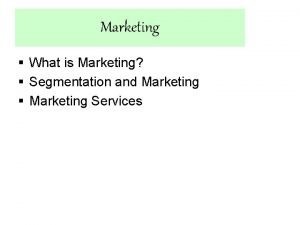Marketing Strategies Whats working and whats new Sponsored







- Slides: 7

Marketing Strategies: What’s working and what’s new? Sponsored by Moderator: Jennifer Close, Senior Marketing Specialist, Peabody Essex Museum Panelists: Alexis Merry, Marketing Manager, Double. Tree by Hilton Boston North Shore Julia Claire Campbell, MPA, J Campbell Social Marketing

Social Media in 2017 FUN FACTS: • 91% of retail brands use 2 or more social media channels • Only 20 Fortune 500 companies actually engage with their followers on Facebook, while 83% have a presence on Twitter • 78% of people who complain to a brand on Twitter expect a response within an hour TIPS: • Don’t let the options overwhelm you • Do your research & choose the best for your organization • Do what you can - Don’t have a presence on a channel unless you have the time to engage with your followers

Choose Your Influencers BLOGGERS – A RECIPE FOR SUCCESS! • Research & find the right blogger for you • Negotiate deal points and confirm expectations • Anticipate and exceed the blogger’s expectations from their stay/visit – offer a unique/new experience • Communicate to your team and make sure they’re aware of the goals of the visit • Send a reminder to your blogger & team in advance of the visit • During the blogger’s visit, monitor social channels – and where appropriate engage • After the visit – send a follow up thank you and encourage further questions TIP: ONCE YOU HAVE FOUND YOUR INFLUENCERS – RESEARCH AND MAKE SURE THEY FIT YOUR ORGANIZATION’S NEEDS AND HAVE THE AUDIENCE YOU ARE TRYING TO REACH

Harlem Lovebirds • Reached over 5, 000 fans in 4 days • Of note: That 5, 000 was the perfect target audience for Co. Co Key

Cape Cod Moms • With posts on Facebook, Instagram and You. Tube, Cape Cod Moms reached over 3, 000 target audience fans for Co. Co Key.

Kid. Tripster. com

Responding to Customers • Fault: Talking about whether or not it was the business’ “fault” or the customer’s “fault” sounds defensive and offputting. • Policy: Telling customers that circumstances are based on a "policy" sounds inflexible and uncaring. • Blame: Using "blame" in a reply to a customer sets up a counterproductive right vs. wrong scenario. • Department: “Department” emphasizes the operating structure of the company, which is not something relevant to the customer. • Our: When using the word "our" the person replying to the customer is speaking on behalf of the collective business. This lacks humanity and a personal touch. • Misunderstanding: “Misunderstanding" emphasizes that somehow the customer made an error or was unable to fully grasp key information. • Try: “Try" sets up an incomplete, open-ended, sequence of events such as "We'll try to do better next time. " • If: "We're sorry IF you were disappointed in your stay with us" is common phrasing. The company already knows the customer was disappointed - that's why they left a negative comment or review. Much better phrasing is "Your stay was less than perfect. I'm so sorry that happened. ” • But: Don't say "We'd like to offer you a refund, BUT our policy prohibits us from doing so. " Instead say, "I cannot give you a refund. I CAN offer you…” • Per: Too formal, not human, and totally unnecessary. • Just: "I JUST called to say I'm sorry" is a good song lyric and a decent customer response. It would be better as "I called to say I'm sorry. “ • Consider: "We'll CONSIDER your suggestions. . . " can easily be interpreted as dismissive and insincere. • Seems: “Seems" is a word used when trying to interpret or make sense of something. It is clear that the customer had a bad experience, because they complained about it.













